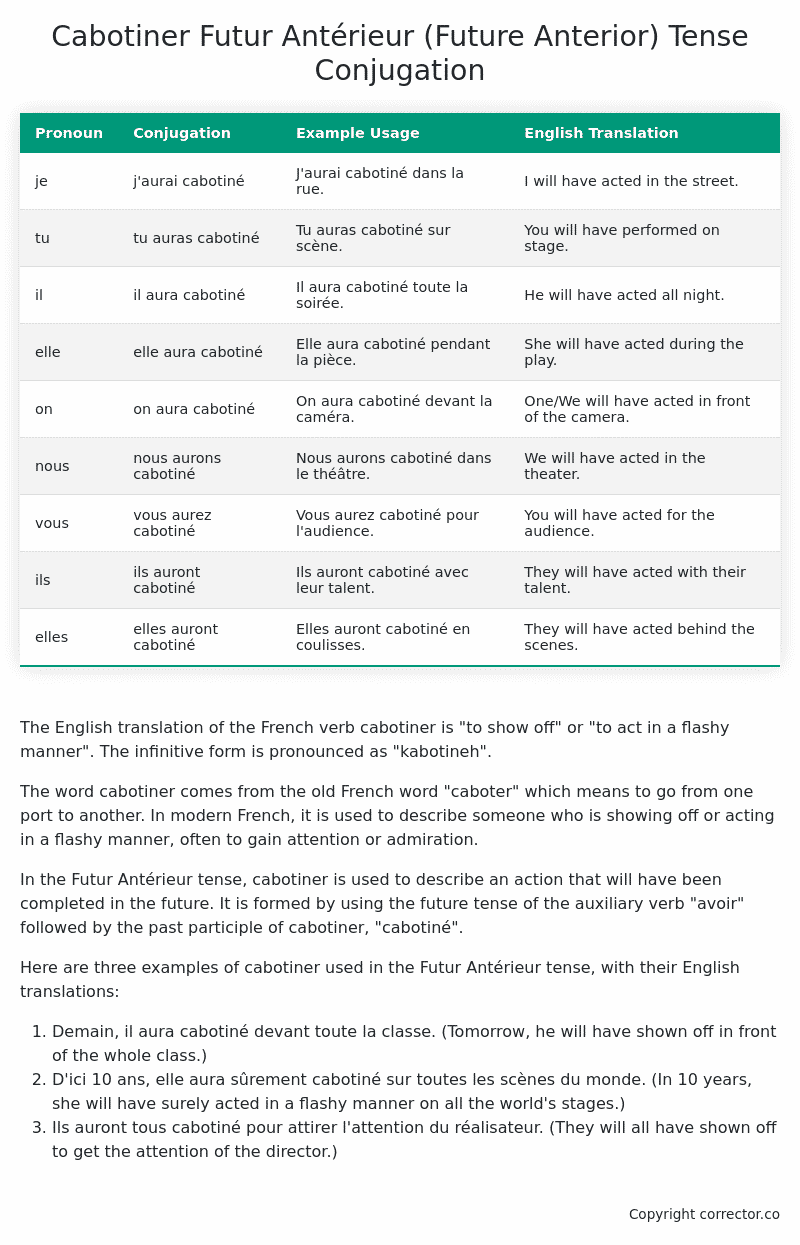Futur Antérieur (Future Anterior) Tense Conjugation of the French Verb cabotiner
Introduction to the verb cabotiner
The English translation of the French verb cabotiner is “to show off” or “to act in a flashy manner”. The infinitive form is pronounced as “kabotineh”.
The word cabotiner comes from the old French word “caboter” which means to go from one port to another. In modern French, it is used to describe someone who is showing off or acting in a flashy manner, often to gain attention or admiration.
In the Futur Antérieur tense, cabotiner is used to describe an action that will have been completed in the future. It is formed by using the future tense of the auxiliary verb “avoir” followed by the past participle of cabotiner, “cabotiné”.
Here are three examples of cabotiner used in the Futur Antérieur tense, with their English translations:
- Demain, il aura cabotiné devant toute la classe. (Tomorrow, he will have shown off in front of the whole class.)
- D’ici 10 ans, elle aura sûrement cabotiné sur toutes les scènes du monde. (In 10 years, she will have surely acted in a flashy manner on all the world’s stages.)
- Ils auront tous cabotiné pour attirer l’attention du réalisateur. (They will all have shown off to get the attention of the director.)
Table of the Futur Antérieur (Future Anterior) Tense Conjugation of cabotiner
| Pronoun | Conjugation | Example Usage | English Translation |
|---|---|---|---|
| je | j’aurai cabotiné | J’aurai cabotiné dans la rue. | I will have acted in the street. |
| tu | tu auras cabotiné | Tu auras cabotiné sur scène. | You will have performed on stage. |
| il | il aura cabotiné | Il aura cabotiné toute la soirée. | He will have acted all night. |
| elle | elle aura cabotiné | Elle aura cabotiné pendant la pièce. | She will have acted during the play. |
| on | on aura cabotiné | On aura cabotiné devant la caméra. | One/We will have acted in front of the camera. |
| nous | nous aurons cabotiné | Nous aurons cabotiné dans le théâtre. | We will have acted in the theater. |
| vous | vous aurez cabotiné | Vous aurez cabotiné pour l’audience. | You will have acted for the audience. |
| ils | ils auront cabotiné | Ils auront cabotiné avec leur talent. | They will have acted with their talent. |
| elles | elles auront cabotiné | Elles auront cabotiné en coulisses. | They will have acted behind the scenes. |
Other Conjugations for Cabotiner.
Le Present (Present Tense) Conjugation of the French Verb cabotiner
Imparfait (Imperfect) Tense Conjugation of the French Verb cabotiner
Passé Simple (Simple Past) Tense Conjugation of the French Verb cabotiner
Passé Composé (Present Perfect) Tense Conjugation of the French Verb cabotiner
Futur Simple (Simple Future) Tense Conjugation of the French Verb cabotiner
Futur Proche (Near Future) Tense Conjugation of the French Verb cabotiner
Plus-que-parfait (Pluperfect) Tense Conjugation of the French Verb cabotiner
Passé Antérieur (Past Anterior) Tense Conjugation of the French Verb cabotiner
Futur Antérieur (Future Anterior) Tense Conjugation of the French Verb cabotiner (this article)
Subjonctif Présent (Subjunctive Present) Tense Conjugation of the French Verb cabotiner
Subjonctif Passé (Subjunctive Past) Tense Conjugation of the French Verb cabotiner
Subjonctif Imparfait (Subjunctive Imperfect) Tense Conjugation of the French Verb cabotiner
Subjonctif Plus-que-parfait (Subjunctive Pluperfect) Tense Conjugation of the French Verb cabotiner
Conditionnel Présent (Conditional Present) Tense Conjugation of the French Verb cabotiner
Conditionnel Passé (Conditional Past) Tense Conjugation of the French Verb cabotiner
L’impératif Présent (Imperative Present) Tense Conjugation of the French Verb cabotiner
L’infinitif Présent (Infinitive Present) Tense Conjugation of the French Verb cabotiner
Struggling with French verbs or the language in general? Why not use our free French Grammar Checker – no registration required!
Get a FREE Download Study Sheet of this Conjugation 🔥
Simply right click the image below, click “save image” and get your free reference for the cabotiner Futur Antérieur tense conjugation!

Cabotiner – About the French Futur Antérieur (Future Anterior) Tense
Construction
Common Everyday Usage Patterns
Interactions with Other Tenses
For example
Summary
I hope you enjoyed this article on the verb cabotiner. Still in a learning mood? Check out another TOTALLY random French verb conjugation!


